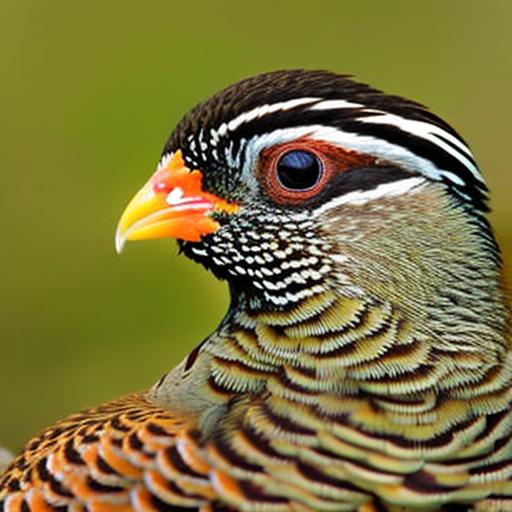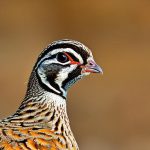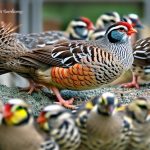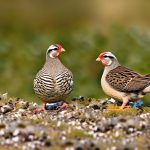Quails are small, ground-dwelling birds that are becoming increasingly popular as pets. They are known for their gentle nature, low maintenance, and entertaining behavior, making them an ideal choice for bird enthusiasts. Quails come in a variety of species, with the most common being the Japanese quail, also known as the Coturnix quail. These birds are relatively easy to care for and can be kept in a backyard or indoor setting, making them a versatile pet option for many people.
Quails are known for their social nature and can thrive in small flocks, making them an excellent choice for those looking to keep multiple birds. They are also relatively quiet compared to other bird species, making them suitable for urban environments where noise may be a concern. Additionally, quails are known for their ability to lay eggs, making them not only a delightful pet but also a potential source of fresh eggs for their owners. Overall, quails make for charming and low-maintenance pets that can bring joy and entertainment to any household.
Key Takeaways
- Quails make great pets due to their small size, low maintenance, and friendly nature.
- A suitable enclosure for quails should provide enough space for them to move around, with proper ventilation and protection from predators.
- Quails require a balanced diet of commercial quail feed, supplemented with fresh greens and protein sources.
- Regular health check-ups and vaccinations are essential for keeping quails healthy and preventing diseases.
- Quails are social birds that thrive in small flocks, and they enjoy activities such as dust bathing and foraging.
Housing and Enclosure for Quails
When it comes to housing and enclosure for quails, it’s essential to provide them with a safe and comfortable environment that meets their specific needs. Quails are ground-dwelling birds and require ample space to move around and forage. A suitable enclosure for quails should be spacious, well-ventilated, and secure to protect them from predators. It’s important to provide a solid floor in the enclosure to prevent injury to their delicate feet, as well as a sheltered area where they can seek refuge from the elements.
The flooring of the enclosure should be covered with a soft bedding material, such as straw or wood shavings, to provide a comfortable surface for the quails to walk on. Additionally, it’s crucial to provide adequate protection from extreme temperatures, as quails are sensitive to heat and cold. In colder climates, a heat lamp or heated pad can be used to keep the quails warm, while in warmer climates, providing shade and access to cool water is essential to prevent heat stress. Overall, a well-designed enclosure with plenty of space, protection from the elements, and comfortable bedding is essential for keeping quails happy and healthy.
Feeding and Nutrition for Quails
Proper feeding and nutrition are crucial for the health and well-being of quails. These birds have specific dietary requirements that must be met to ensure they remain healthy and thrive in captivity. A balanced diet for quails should consist of high-quality commercial quail feed, which is specially formulated to meet their nutritional needs. Additionally, quails should have access to fresh water at all times, as dehydration can quickly lead to health issues.
In addition to commercial feed, quails can also benefit from a variety of fresh foods, such as fruits, vegetables, and insects, which can be offered as occasional treats. It’s important to monitor the quails’ food intake and adjust their diet as needed to prevent obesity or malnutrition. Providing a balanced diet rich in essential nutrients is essential for maintaining the overall health and vitality of quails. Additionally, offering grit or small stones can help aid in the digestion of food in quails, as they do not have teeth and rely on the grit to grind their food in their gizzards. Overall, proper feeding and nutrition are essential for keeping quails healthy and happy in captivity.
Health and Veterinary Care for Quails
Maintaining the health of quails is essential for their overall well-being and longevity. Regular health checks should be conducted to monitor the quails’ condition and detect any potential health issues early on. It’s important to observe the quails’ behavior, appetite, and droppings regularly to identify any changes that may indicate illness or distress. Additionally, providing a clean and hygienic environment is crucial for preventing the spread of diseases and parasites among quails.
In the event of illness or injury, it’s essential to seek veterinary care from a professional with experience in avian medicine. A qualified veterinarian can provide proper diagnosis and treatment for any health issues that may arise in quails. Additionally, vaccinations may be recommended to protect quails from common diseases prevalent in their environment. It’s important to follow proper quarantine procedures when introducing new quails into an existing flock to prevent the spread of diseases. Overall, maintaining the health of quails requires regular monitoring, proper hygiene, and access to veterinary care when needed.
Behavior and Socialization of Quails
Quails are social birds that thrive in the company of their own kind. They are known for their gentle nature and can form strong bonds with their flock mates. It’s essential to keep quails in small groups to prevent loneliness and provide them with opportunities for social interaction. In a flock setting, quails will engage in various social behaviors, such as grooming each other, communicating through vocalizations, and establishing a pecking order within the group.
Quails are also known for their curious and active nature, spending much of their time foraging for food and exploring their environment. Providing enrichment activities, such as dust baths, perches, and hiding spots, can help keep quails mentally stimulated and prevent boredom. Additionally, handling quails gently from a young age can help them become more comfortable with human interaction, making them more sociable pets. Overall, understanding the behavior and social needs of quails is essential for providing them with a fulfilling and enriching environment.
Breeding and Reproduction of Quails
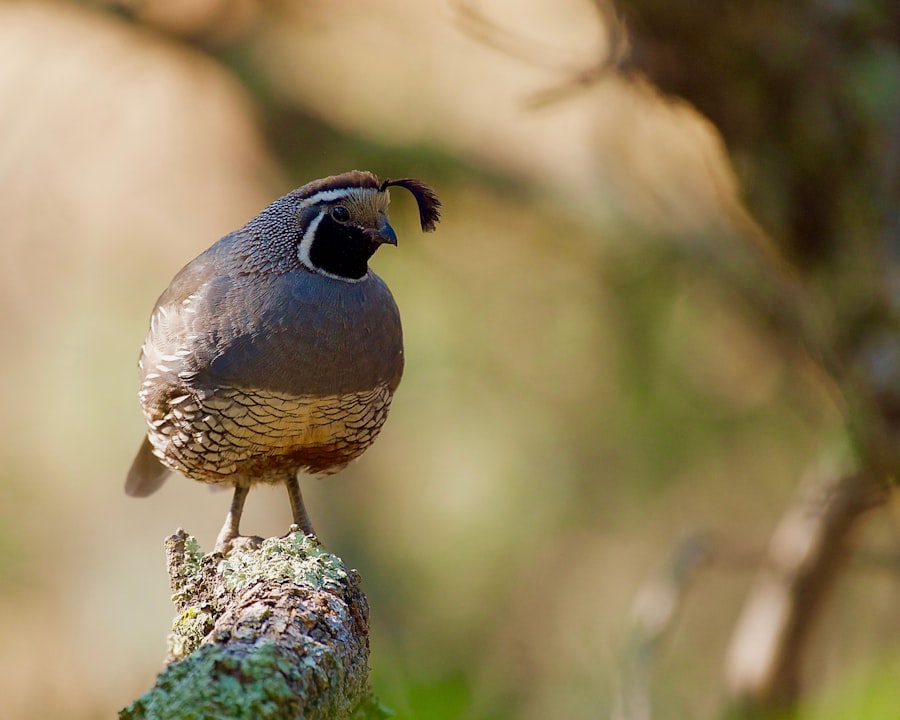
Quails are prolific breeders and can reproduce at a rapid rate under the right conditions. When kept in a suitable environment with proper nutrition and care, quails will often begin laying eggs as early as six weeks of age. Female quails can lay an egg almost every day during the breeding season, which typically occurs in the spring and summer months. It’s important to provide nesting boxes or areas where female quails can lay their eggs in privacy and safety.
Once eggs are laid, they can be collected and incubated if breeding is desired. Incubation typically takes around 17 days before the eggs hatch into adorable chicks. It’s important to provide a warm and secure environment for the chicks to grow and develop after hatching. Additionally, it’s crucial to monitor the breeding process closely to prevent overpopulation and ensure the well-being of both adult quails and their offspring. Overall, understanding the breeding behavior of quails is essential for those interested in raising these birds as pets or for egg production.
Tips for Keeping Quails Happy and Healthy
Keeping quails happy and healthy requires attention to their specific needs and behaviors. Providing a spacious and secure enclosure with comfortable bedding is essential for their well-being. Additionally, offering a balanced diet rich in essential nutrients is crucial for maintaining their overall health. Regular health checks and access to veterinary care are also important for preventing and treating any potential health issues that may arise.
Socialization is key to keeping quails happy, so it’s important to keep them in small flocks to prevent loneliness and provide opportunities for social interaction. Providing enrichment activities can help keep them mentally stimulated and prevent boredom. Finally, understanding the breeding behavior of quails is essential for those interested in raising these birds as pets or for egg production. By following these tips, quail owners can ensure that their feathered friends lead happy and healthy lives in captivity.
If you’re considering keeping quails as pets, you may also be interested in learning about creating the perfect farmhouse chicken coop. Poultry Wizard offers a comprehensive guide on building and maintaining a farmhouse chicken coop, which can be found here. Just like quails, chickens require a suitable living environment to thrive, and this article provides valuable insights into creating a comfortable and functional space for your feathered friends.
FAQs
What are quails?
Quails are small ground-dwelling birds that are found in various parts of the world. They are known for their distinctive calls and are often kept as pets or for their eggs and meat.
Can quails be kept as pets?
Yes, quails can be kept as pets. They are relatively low-maintenance and can be kept in a backyard or in a suitable indoor enclosure.
What do quails eat?
Quails are omnivorous and eat a diet that consists of seeds, insects, and small plants. They can also be fed commercial quail feed that is available at pet stores.
What kind of housing do quails need?
Quails require a secure enclosure that protects them from predators and provides them with enough space to move around. They also need a sheltered area to protect them from the elements.
Do quails need companionship?
Quails are social birds and do best when kept in small groups. It is recommended to keep at least two or more quails together to provide them with companionship.
Are quails noisy?
Quails are known for their distinctive calls, which can be quite loud. It is important to consider the noise level when keeping quails as pets, especially if you live in a residential area.
Do quails require any special care?
Quails require regular access to clean water, a balanced diet, and a clean living environment. They also need protection from predators and regular health check-ups.
Can quails be handled and trained?
Quails are generally not as easily handled or trained as other pet birds, such as parrots. However, with patience and gentle handling, some quails can become more comfortable with human interaction.
Meet Walter, the feathered-friend fanatic of Florida! Nestled in the sunshine state, Walter struts through life with his feathered companions, clucking his way to happiness. With a coop that’s fancier than a five-star hotel, he’s the Don Juan of the chicken world. When he’s not teaching his hens to do the cha-cha, you’ll find him in a heated debate with his prized rooster, Sir Clucks-a-Lot. Walter’s poultry passion is no yolk; he’s the sunny-side-up guy you never knew you needed in your flock of friends!

